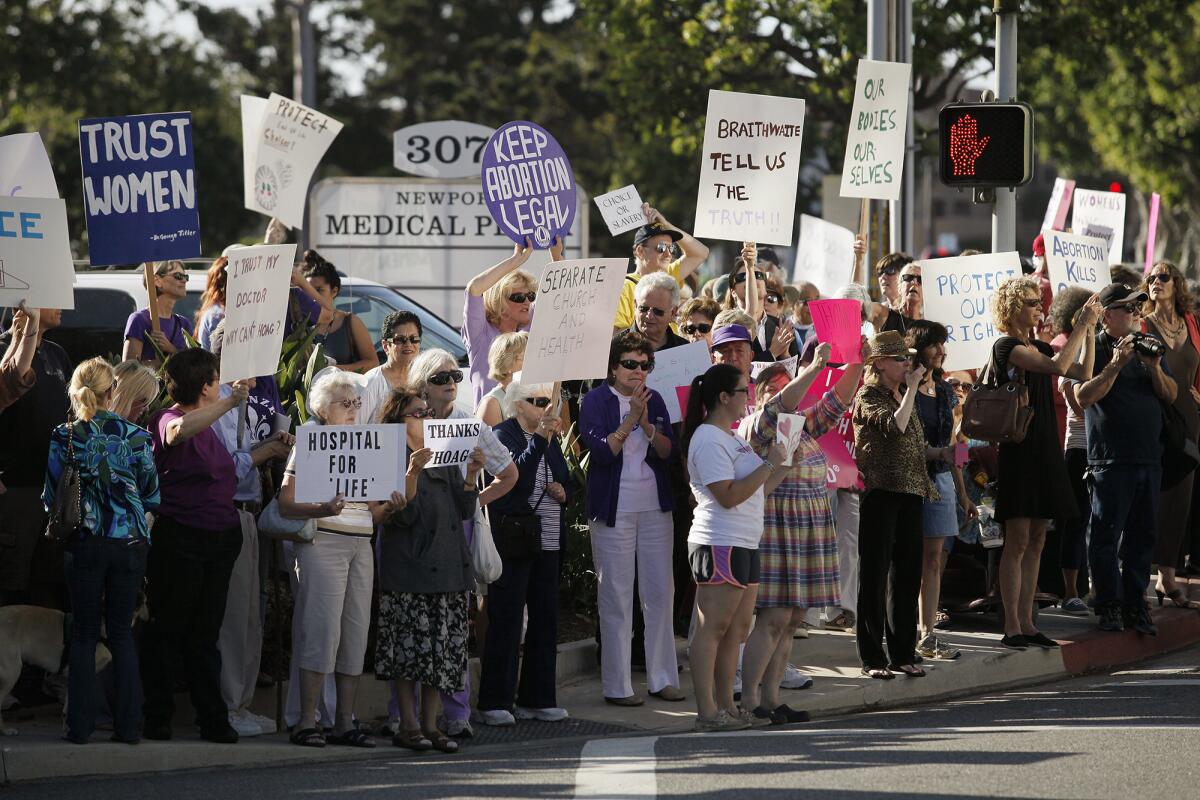Attorney general, Hoag Hospital reach accord on abortion

The state attorney general’s office has found that Newport Beach’s Hoag Hospital can continue to refuse to provide elective abortions, as long as the hospital helps women access those services elsewhere, according to an agreement released Friday.
The agreement, which was approved by the office and Hoag last month, closes an investigation sparked by allegations that the hospital had misrepresented the effects of its partnership with a Catholic healthcare provider and was limiting women’s access to a full array of reproductive health services.
“We spent several months investigating those allegations and negotiating with Hoag,” Special Asst. Atty. General Jill Habig said. “The agreement addresses the concerns that were raised and takes several affirmative steps to ensure women’s access to reproductive healthcare.”
Last spring — not long after Hoag entered into an initial affiliation agreement with St. Joseph Health, which was approved by the state attorney general’s office in February, 2013 — Hoag officials announced that they would halt elective abortion services at the hospital.
At the time, officials said it was due to low demand for procedure, though interviews and documents later showed that the move was a known condition of Hoag’s partnership with St. Joseph Health — whose statement of common values prohibits elective, or “direct,” abortions.
The ban drew fierce protest from women’s health advocates and Hoag doctors, who said they had been told that the partnership with St. Joseph would not require them to drop any services.
The ban, they said, inhibits their ability to give their patients the best care possible.
The move also stoked concerns about religion’s role in a changing healthcare landscape, where a growing number of non-Catholic providers have merged or partnered with Catholic institutions.
As a result of the outcry, the state attorney general’s office opened the investigation. The office also looked at whether Hoag officials were accurate in reporting that the hospital did fewer than 100 elective abortions each year.
Habig wouldn’t confirm whether the investigation found that that was accurate, saying that the agreement was forward-looking.
Its provisions include extending the time that Hoag must continue to provide all reproductive health services except elective abortions from 10 years to 20 years.
That means Hoag is forbidden from refusing to perform procedures that may conflict with St. Joseph’s religious directives, such as tubal ligations, through 2033.
The document also lays out reporting processes that Hoag must follow to ensure that the hospital is complying with the terms of the agreement.
The agreement’s 20-year term, she said, was “robust, but reasonable,” given the speed with which healthcare changes.
In a statement, Hoag President and Chief Executive Robert Braithwaite said that the institution fully supports the agreement, which he described as a series of “clarifications of the original conditions” of its affiliation with St. Joseph.
The two, non-profit healthcare providers have maintained their own different faith identities — Catholic and Presbyterian, respectively — and operate independently of one another. The partnership, officials said at the time, would lead to broader, more integrated healthcare services in Orange County. St. Joseph Health System operates five hospitals in Southern California, and Hoag has two hospitals and several clinics.
“We know our community will reap significant benefits from this affiliation,” Braithwaite said. “We’re excited to continue these efforts in a way that solves some of today’s health care challenges and mitigates those we see in the future.”